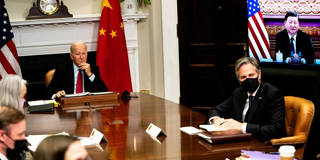America's latest efforts to block China's technological and economic development are likely to do more harm than good. The peaceful economic relationship of the past 30 years may not have been perfect, but it was certainly better than what will come from zero-sum rivalry and mutual suspicion.
NEW HAVEN – Just days before the White House released the United States’ new National Security Strategy in October, President Joe Biden’s administration announced sweeping export restrictions aimed at stopping China from advancing technologically. “The world is changing,” the National Security Strategy observes – and the US is evidently responding by all but declaring economic war on China, using trade as its primary weapon.
Yet this development received scant mainstream media coverage. As Edward Luce of the Financial Times notes, “a superpower declared war on a great power and nobody noticed.” This is perhaps not surprising, given the fickleness of the news cycle and the competing spectacles of Twitter layoffs and cryptocurrency meltdowns. But the new US policy toward China will be far more consequential than either of those stories.
Consider US National Security Adviser Jake Sullivan’s rather sobering suggestion, in September, that it is no longer enough for the world’s largest economy simply to outcompete its economic rivals through technological innovation. The implication is that America must do whatever it can to hold those rivals back, and to inflict as much economic pain on them as possible. Yet this outlook clearly signals weakness. It is an admission that policies aimed at increasing America’s own economic competitiveness may have only limited success.

NEW HAVEN – Just days before the White House released the United States’ new National Security Strategy in October, President Joe Biden’s administration announced sweeping export restrictions aimed at stopping China from advancing technologically. “The world is changing,” the National Security Strategy observes – and the US is evidently responding by all but declaring economic war on China, using trade as its primary weapon.
Yet this development received scant mainstream media coverage. As Edward Luce of the Financial Times notes, “a superpower declared war on a great power and nobody noticed.” This is perhaps not surprising, given the fickleness of the news cycle and the competing spectacles of Twitter layoffs and cryptocurrency meltdowns. But the new US policy toward China will be far more consequential than either of those stories.
Consider US National Security Adviser Jake Sullivan’s rather sobering suggestion, in September, that it is no longer enough for the world’s largest economy simply to outcompete its economic rivals through technological innovation. The implication is that America must do whatever it can to hold those rivals back, and to inflict as much economic pain on them as possible. Yet this outlook clearly signals weakness. It is an admission that policies aimed at increasing America’s own economic competitiveness may have only limited success.